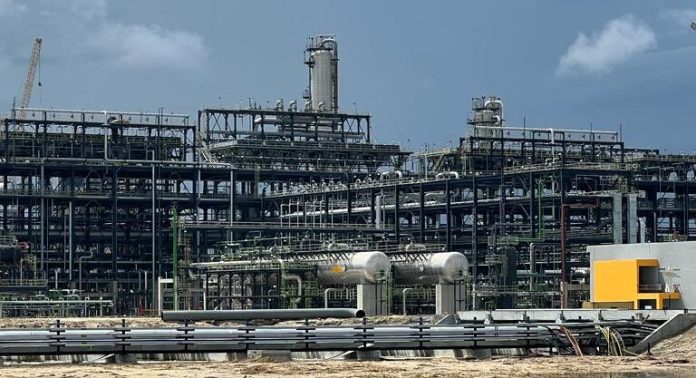Abdulraheem muhammed olarewaju
Widespread public discussion has been generated by the recent revelation from the Nigerian Midstream and Downstream Petroleum Regulatory Authority (NMDPRA) that the Dangote refinery is not yet licensed to start operations.
Made by Chief Executive Officer Farouk Ahmed of NMDPRA, this announcement runs counter to past impressions and has resulted in notable public protest.
Ahmed’s claim that the refinery is still in the pre-commissioning stage and the subsequent public outcry demonstrate the complexity and vested interests within Nigeria’s oil industry.
The public response to the disclosure has been overwhelmingly negative, combining calls for responsibility with mistrust and resentment.
In reaction to the announcement, a Facebook user, Theophilous Ebegbune, expressed a widely held belief that powerful cabals are at work to prevent Nigeria from escaping its dependency on imported fuel. “It’s not far-fetched from the truth, the so-called cabals are at work. Those who do not want us to get out of this darkness of poverty in the midst of plenty. God will punish and expose them all. Starting from NNPC,” Ebegbune stated.
Another user, Dapo Oyedele, accused Ahmed of being part of a conspiracy to maintain fuel importation. “He must be a part of the cabal that doesn’t want Nigeria to stop importation of fuel. If he can say that openly, he should be removed from that position. Nigerians want to stop importation of fuel and Dangote is doing his best and should be supported by everyone,” Oyedele asserted.
On the other hand, some comments have emerged in support of Ahmed. Calme Martinez argued that the NMDPRA boss is protecting national interests. “NMDPRA boss is working hard to protect the interests of the country. I want all Nigerians to put hands and support this man from being removed,” Martinez said, indicating a belief that Ahmed’s actions are in the best interest of regulatory standards and national welfare.
Toye Tunde raised questions about whether Ahmed’s statements reflect the federal government’s position or his personal opinion. “Does that represent the position of the federal government or his personal opinion? If it’s that of the federal government then, there are issues there but if it is a personal opinion then, he is either standing in for the cabals or expressing the jealousy of Nigeria’s oil company, NNPLC. I come in peace!” he said.
Adding a technical perspective, Babatola Taiwo highlighted concerns about the quality of products from the Dangote refinery. “The diesel density produced by Dangote is low, 0.82. The man is saying the truth for those of us in the industry but I believe there’s always room for improvement,” Taiwo noted.
Ezekwem Chijioke emphasized the need for evidence and suggested that the Dangote refinery should take legal action if Ahmed’s claims are unsubstantiated. “If they have substantial evidence to prove the claim, then Dangote refinery should be held accountable; otherwise, the refinery should take legal action against him,” Chijioke stated.
Adewumi Ayo Ajibade’s comments highlighted deep-seated distrust in the NNPC, suggesting that the organization holds disproportionate power over national affairs. “NNPC has finally executed the coup d’état they have been planning for years. NNPC is the real government. They have turned Tinubu into their appointed Prime Minister. Whatever they say is law. May God deliver Nigeria,” Ajibade remarked.
Tochukwu Mbadugha called for fair competition in the sector and questioned Dangote’s monopoly. “Dangote refinery is a private investment; therefore, nobody should be coerced into whatever obnoxious policy they come with. Enough of Dangote monopoly. Licenses should be given to other companies,” Mbadugha said.
Additional comments reflect a broad spectrum of public opinion. Damilola Akinbami accused the regulatory body of delaying Nigeria’s progress. “NMDPRA should be fast-tracking this process, not delaying it. We need to be refining our own fuel, not importing. This is sabotage!” Akinbami expressed frustration.
Furthermore, Amaka Chukwuma emphasized the importance of stringent regulatory processes. “Before rushing to conclusions, we need to understand that safety and standards are paramount. The NMDPRA is ensuring that the refinery meets all necessary requirements before it becomes operational,” Chukwuma argued.
Chima Okafor expressed concerns about the broader implications for Nigeria’s economy. “The delay in licensing the Dangote refinery has economic implications. We need this refinery operational to boost our economy and reduce our dependence on imported fuel,” Okafor stated.




